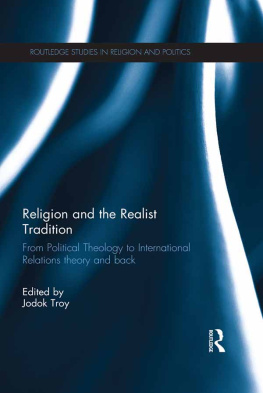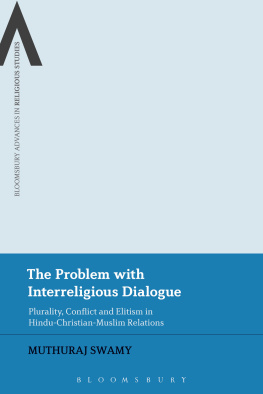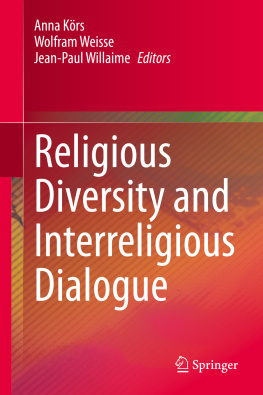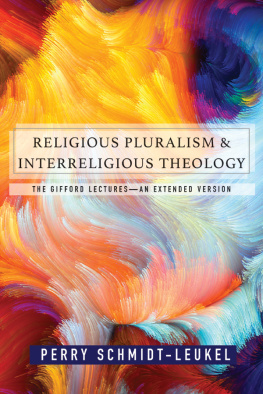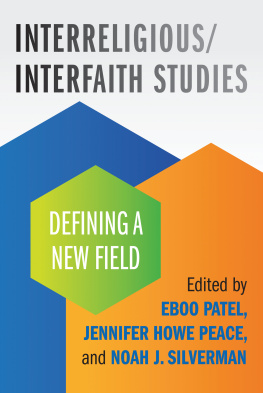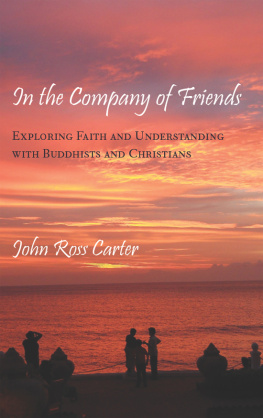UNDERSTANDING INTERRELIGIOUS RELATIONS
UNDERSTANDING INTERRELIGIOUS RELATIONS
EDITED BY
David Cheetham, Douglas Pratt,
and David Thomas


Great Clarendon Street, Oxford, OX2 6DP,
United Kingdom
Oxford University Press is a department of the University of Oxford.
It furthers the Universitys objective of excellence in research, scholarship, and education by publishing worldwide. Oxford is a registered trade mark of
Oxford University Press in the UK and in certain other countries
Oxford University Press 2013
The moral rights of the authors have been asserted
First Edition published in 2013
Impression: 1
All rights reserved. No part of this publication may be reproduced, stored in a retrieval system, or transmitted, in any form or by any means, without the prior permission in writing of Oxford University Press, or as expressly permitted by law, by licence or under terms agreed with the appropriate reprographics rights organization. Enquiries concerning reproduction outside the scope of the above should be sent to the Rights Department, Oxford University Press, at the address above
You must not circulate this work in any other form and you must impose this same condition on any acquirer
Published in the United States of America by Oxford University Press
198 Madison Avenue, New York, NY 10016, United States of America
British Library Cataloguing in Publication Data
Data available
Library of Congress Control Number: 2013938320
ISBN 9780199645848 (hbk.)
9780199645855 (pbk.)
As printed and bound by
CPI Group (UK) Ltd, Croydon, CR0 4YY
Links to third party websites are provided by Oxford in good faith and for information only. Oxford disclaims any responsibility for the materials contained in any third party website referenced in this work.
CONTENTS
DAVID CHEETHAM, DOUGLAS PRATT, AND DAVID THOMAS
DAVID CHEETHAM
JEFFERY D. LONG
ED KESSLER
ELIZABETH J. HARRIS
PERRY SCHMIDT-LEUKEL
DAVID THOMAS
ANDREW WINGATE
MARIANNE MOYAERT
PETER C. PHAN AND JONATHAN Y. TAN
DOUGLAS PRATT
ANNA HALAFOFF
NICHOLAS ADAMS
MARIO I. AGUILAR
CATHERINE CORNILLE
DAVID R. VISHANOFF
PAUL WELLER
DAVID CHEETHAM, DOUGLAS PRATT, AND DAVID THOMAS
Nicholas Adams is a lecturer in the School of Divinity, University of Edinburgh, UK
Mario I. Aguilar is Professor of Divinity and Director, Centre for the Study of Religion and Politics, University of St Andrews, UK
David Cheetham is a Senior Lecturer in the School of Philosophy, Theology and Religion, University of Birmingham, UK
Catherine Cornille is Professor of Comparative Theology at Boston College, Massachusetts, USA
Anna Halafoff is a Research Fellow at the Centre for Citizenship and Globalisation, Deakin University, Victoria, Australia
Elizabeth J. Harris is an Associate Professor in the Department of Theology, Philosophy and Religious Studies, Liverpool Hope University, UK
Ed Kessler MBE is the Founder Director, Woolf Institute, Cambridge and Fellow of St Edmunds College, Cambridge University, UK
Jeffery D. Long is Professor of Religion and Asian Studies, Elizabethtown College, Pennsylvania, USA
Marianne Moyaert is Professor of Comparative Theology and Interreligious Dialogue at the Free University of Amsterdam, and is concurrently a postdoctoral researcher in the Faculty of Theology, Catholic University of Leuven, Belgium
Peter C. Phan holds the Ignacio Ellacuria Chair of Catholic Social Thought, Theology Department, Georgetown University, Washington, DC, USA
Douglas Pratt is Professor of Religious Studies at the University of Waikato, New Zealand, and is Adjunct Professor of Theology and Interreligious Studies at the University of Bern, Switzerland
Perry Schmidt-Leukel is Professor of Religious Studies and Intercultural Theology at the University of Mnster, Germany
Jonathan Y. Tan is a Senior Lecturer in the School of Theology, Australian Catholic University, Sydney NSW, Australia
David Thomas is Professor of Christianity and Islam and Nadir Dinshaw Professor of Inter Religious Relations, University of Birmingham, UK
David R. Vishanoff is an Associate Professor in the Religious Studies Program of the University of Oklahoma, Oklahoma, USA
Paul Weller is Professor of Inter-Religious Relations, University of Derby, and Visiting Fellow in the Oxford Centre for Christianity and Culture, Regents Park College, University of Oxford, UK
Andrew Wingate OBE is a consultant, teacher, and theologian in interfaith relations, and was the founding Director of the St Philips Centre, Leicester, UK
DAVID CHEETHAM, DOUGLAS PRATT, AND DAVID THOMAS
The ways in which religious communities interact with one another, both historically and in the contemporary world, is now a major focus of scholarly research and teaching. Issues of interfaith engagement, inclusive of interreligious dialogue more specifically, and interreligious (or interfaith) relations more generally, together with issues pertaining to intra-religious engagement, attract widespread interest and concern among scholars and other specialists in religion, as well as also many others who have regard for the role of religion in todays world.theological studies is symptomatic of this new awareness. And increasingly through the media the wider public is being exposed to issues and events that involve the interaction of one religion or religious community with another.
Interest in interreligious relations is undoubtedly growing, and so the aim of this volume is to provide a reference work of relevance to students and scholars, as well as to a wider public. It comprises two main parts. The first provides an introduction to, and expositions and critical discussions of, the ways in which the other has been construed, addressed, and related to, in the major religious traditions. The second provides analyses of select key issues and debates in which interreligious relations are seen to be an integral constituent. It has thus been the intention of the editors to assemble an authoritative and scholarly work that discusses perspectives on the religious other, and on interreligious relations, that are typical of the different religious traditions; and to elicit substantial original chapters from a cross-section of emerging and established scholars on main debates and issues in the wider field of interreligious relations.
As has been often said, ours is an age of increased global religious diversity. Of course, in some parts of the world religious plurality has been the order of the day since time immemorial; in such situations, people have long been used to relating positively and pragmatically to their neighbours of other faiths. Interfaith harmony has had a long-standing pedigree. But equally clashes between religions, or religious groups, have also ebbed and flowed throughout human history, and in our day religion presents as a very pressing issue globally as well as regionally and locallyas seen in evidence of rising mutual anxieties if not outright antipathies between communities of Christians and Muslims. Contemporary flash-points of communal conflict with significant interreligious components are many and include such diverse settings as Thailand, Pakistan, Afghanistan, Syria, and Myanmar. And religions other than Islam and Christianity are also involved. In respect to many socio-political and cultural situations today, religion has a tendency to make things worse even as it can be a force to make things better. Ameliorating what makes things worse, and promoting whatever makes things better, is a challenge and task that not only confronts the religions and their leaders but also impacts upon, and is increasingly taken up by, governments that previously, from a secularist position, had resiled from even admitting religion within the body politic.
Next page

